Emma Thompson leads off the People’s Climate March in London on Sunday afternoon. Vivienne Westwood and Peter Gabriel also attended.
There are reports of 40,000 people joining the march but it felt like a smaller event than The Wave five years ago to me.
There wasn’t a very obvious NGO presence – the occasional Panda but no Avocets or Badgers. It felt a little like a party where someone had forgotten to send out the invitations. Where were the Chief Execs of the environment ‘movement’? I saw John Sauven of Greenpeace but that was it on my tick list. Did anyone see Andy Atkins (FoE) or David Nussbaum (WWF)? Politicians were conspicuous by their absence or low profile. No sign, that I saw, even of the Green Party.
David Cameron attended the march only in the form of a popular placard…
…but we did give him a wave, and were thinking of him, as we passed the end of his street.
It was a large enough crowd to close Parliament Square, and the throngs were enjoying the fine weather…
…as we walked past Big Ben.
One car, with an irritated-looking driver, was allowed into Parliament Square and tried to get through the crowds – it was the Speaker of the House of Commons, John Bercow and family.
There were some speeches that few people would have heard, but the one by Emma Thompson was brief, clear, passionate and right. I’d vote for her.
Meanwhile, in New York, as many as 400,000 people took to the streets of Manhattan ahead of the climate talks there today. It felt to me as though London had fallen far short of what it could have added to the global voice. Given the number of times we are told that climate change is the biggest issue that we face by environmental and development NGOs, and by scientists, and given that there were at least 40,000 people on the streets of London in December 2009, then Sunday’s march looked poor (even though I enjoyed it myself and met quite a few mates too).
London’s march on Sunday was a middling event whereas it should have been massive. Do people care less about climate change now than they did five years ago? I don’t think they do, but it looked as though they might. That isn’t the message that should be sent to New York.
If we are a movement, then we ought to have moved more people to attend. Many of my environmental friends first heard about the event through this blog rather than from the pack of NGOs they support, and many more had missed hearing anything about it at all. If a few blokes can get nearly 600 people to gather in torrential rain in the Peak District to protest at Hen Harriers being killed (as we did), then surely our environment movement could have filled London on a sunny Sunday afternoon?
At least David Cameron is in New York today – unlike the ‘leaders’ of Australia, India or China. It’s almost his last chance to regain some environmental credentials ahead of the General Election next year. But if he was still in London on Sunday, the windows of 10 Downing Street weren’t exactly rattling to the cries of protest, so he may feel that he is only between a rock and a soft place.
[registration_form]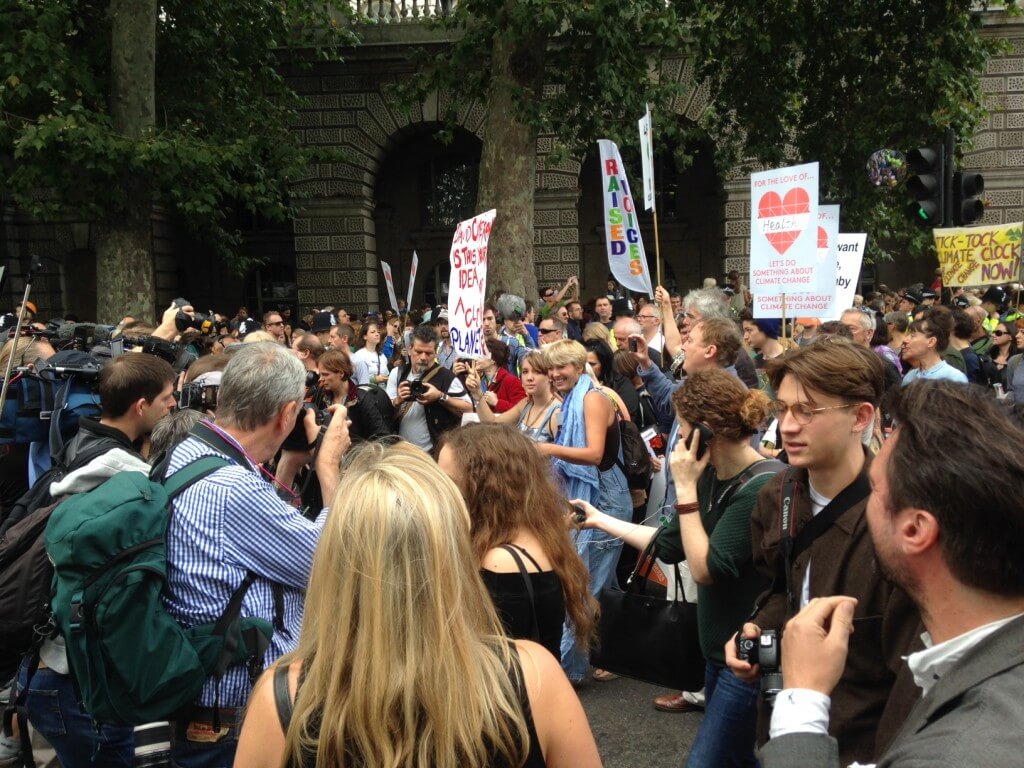
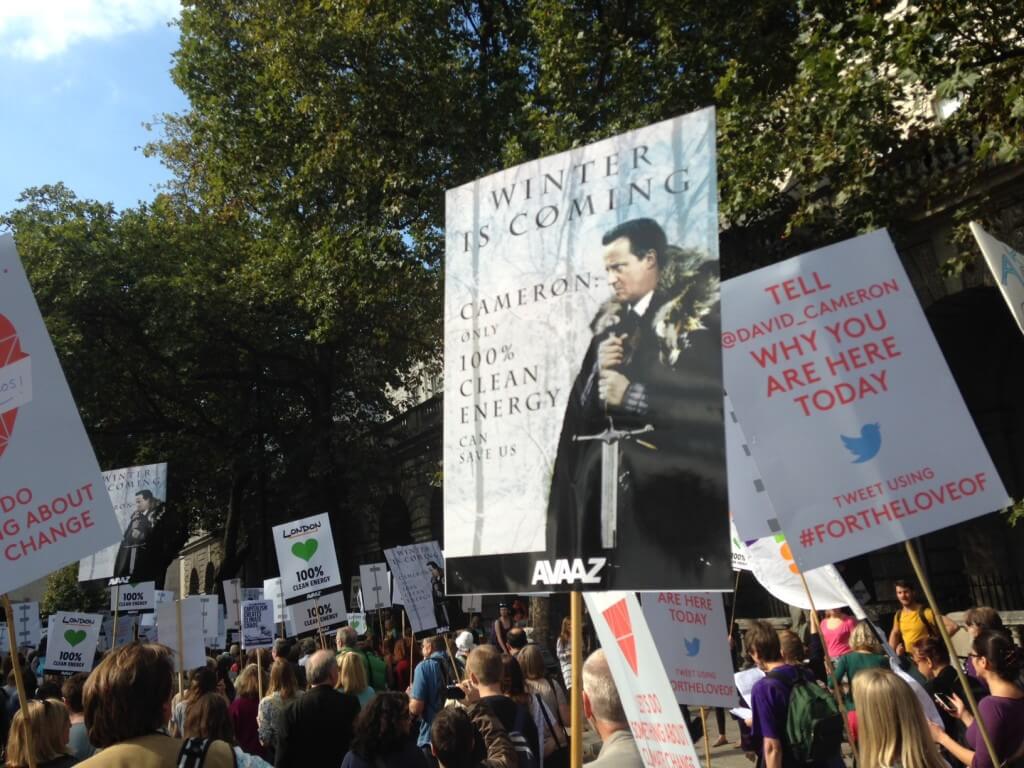
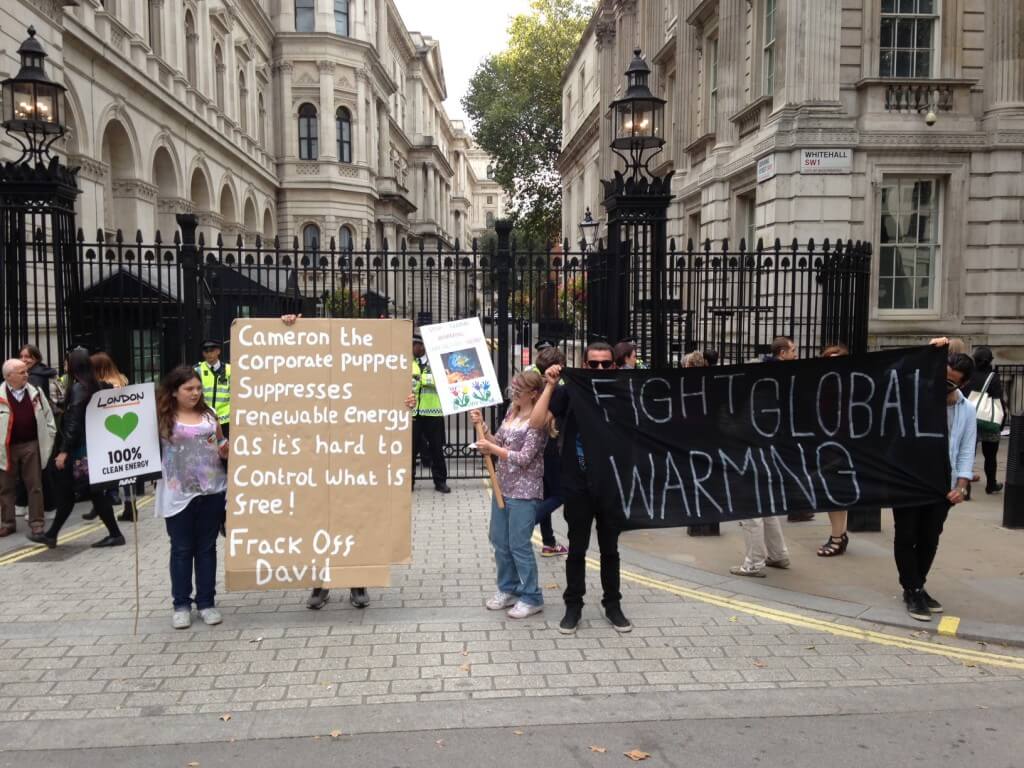
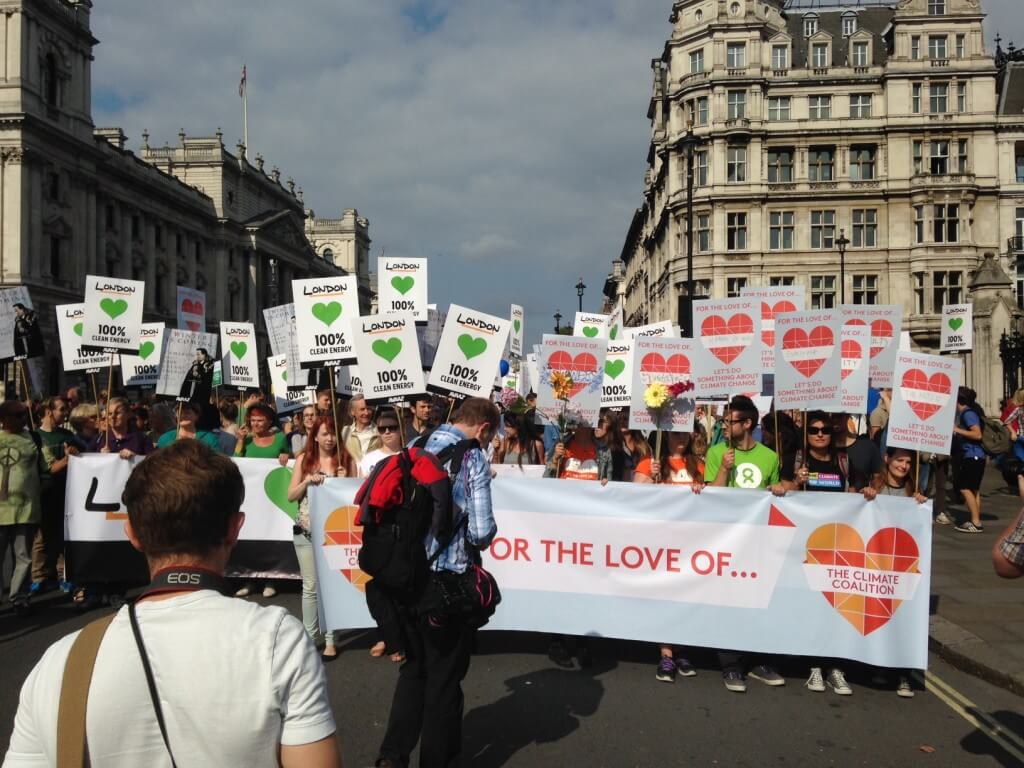
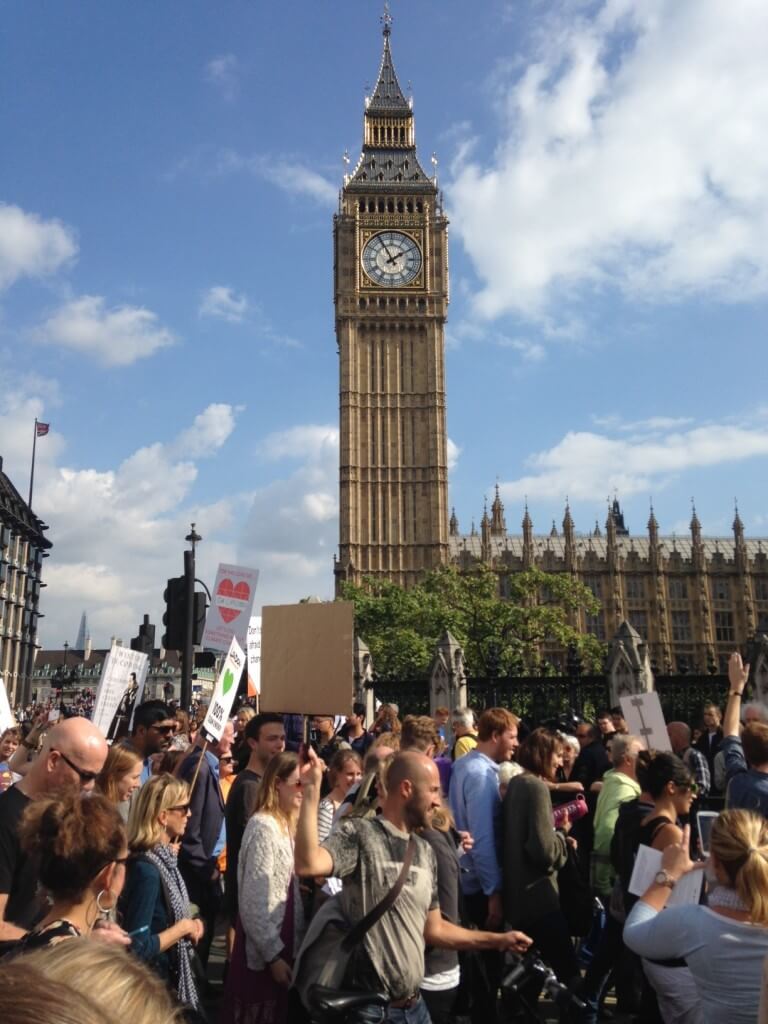
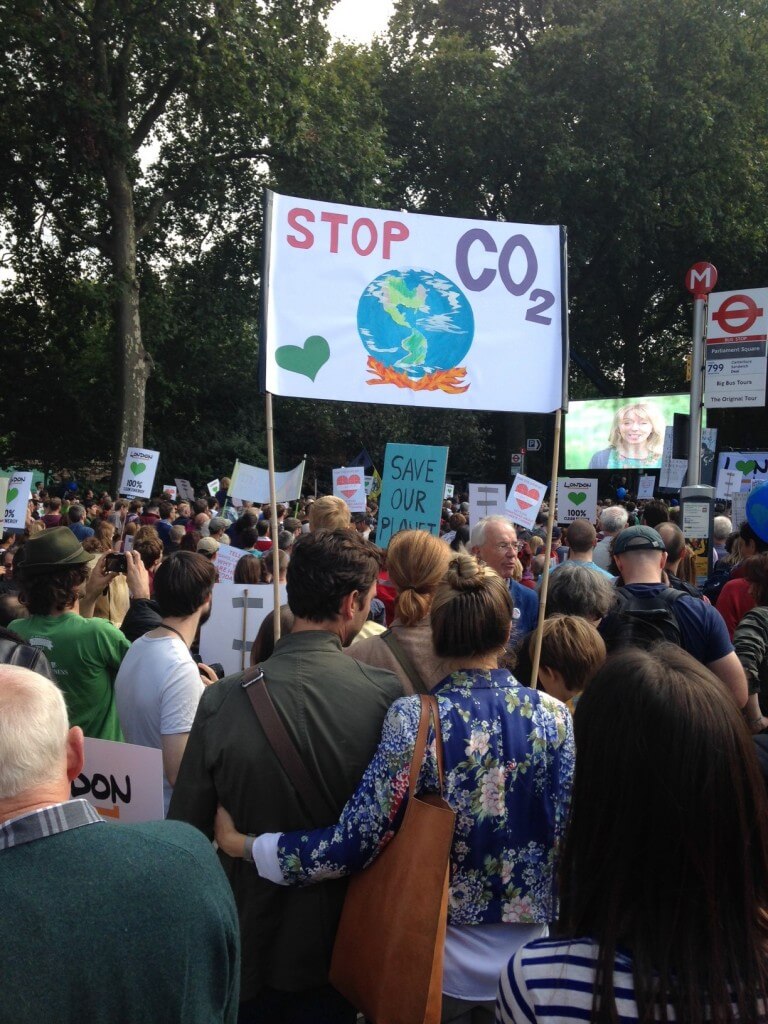
There were quite a lot of Green Party placards where we were in the march but may have been outnumbered by Socialist Workers. Spotted two Lib Dems on the way back to the bus home. I guess Labour were otherwise engaged in Manchester. Favourite slogans: ‘Goldalming against Climate Change’ and ‘Don’t wreck the planet, I’ve got all my stuff stored there’
Stop CO2!! Next march will be by the plants!
I see the Rockefeller big money in oil & fossil fuels says it is withdrawing everything from that, to move all assets into renewables!
That sounds good to me; if big names move in a greener direction others may follow, not that it will make any difference to Cameron & his fossil friends………
I never thought I would see the day when the Daily Mail could muster more apparent enthusiasm about a big environmental event than Mark Avery!
And I’m not sure why you’re so downbeat about the turnout. As far as I can see, it was some 40,000 this time, compared with about 50,000 for the Wave in 2009. That’s not a huge difference, and I think climate change was probably higher on the UK political agenda then than it is now.
I totally agree with your comment about the lack of presence of some major charities – in fact, I’d alter your sentence to read ‘It felt like a party where someone forgot to invite the big NGOs.’ Perhaps as a result, the march involved a large proportion of young people, and that’s what I found so uplifting.
One of the few good things about getting old is that I find I can now strike up sort-of serious conversations with people I have never met before. I can’t pretend to have spoken to a scientifically adequate sample, but I found the responses I got from a dozen or so young people throughout the day really interesting. Nearly all had heard about the march over the internet or by social media, often via AVAAZ or 38 Degrees. Most had heard of the RSPB, but not one had considered joining it or the Wildlife Trusts or National Trust (some hadn’t even heard of these). But they were generally well informed and surprisingly aware politically. Interestingly, most were there in the hope of protecting wildlife and the natural world (not to preserve coastal cities or food security, for example).
I came away thinking that there was a huge reservoir of concern and enthusiasm for wildlife and an appetite for activism among young people that the big conservation NGOs were hardly touching.
Alan – I’m a bit sceptical about the 40k this time around myself.
I think there must be some back-story to this event although I am only guessing.
Yes, young people are wonderful aren’t they? And there seem to be more of them every year!
The land of Exxon-Mobil managed 3-400,000 people on the streets of New York – we fell far short. Why?
It was their party. So far as I was aware everyone else was organising a march in support of the march in New York. Yes, it would have been nice if more people had come out, and that was certainly possible, but for a march in support of a march it wasn’t bad.
Graham – ahh. And I thought I was marching for clean energy (in the UK and everywhere else) and #forthelove of people and the rest of life on earth – but I was marching in support of a march, was I?
Mark – the reason several commentators have given for the larger turnout in New York compared with London is simple – Hurricane Sandy. If large parts of London, including the underground and major hospitals, had flooded recently I think more people would have come. But I think it’s more complicated than that, as I’ll try to outline in a later comment.
Alan – I’m sure that is one reason, but as you say, it isn’t the only reason. The fact that the march was not widely promoted by a whole range of large membership UK NGOs is surely a much bigger reason.
Why do we fall short Mark?
How many times has this blog focussed on climate change?
How many on Hen Harriers?
There’s part of your answer at least.
Climate change is depressing and requires a look at our whole value system, and the way we are living, and then needs us to take some personal responsibility and make changes. That’s a big ask for people who like a modern high consumption lifestyle…
Maybe the environmental NGO’s are wising up. Trillions have been spent on increasing the price of energy, denying the poorest on our planet low cost energy, so keeping them poor to procreate for longer. In the meantime, can anyone detect any reduction whatsoever in the inexorable rise of CO2 in the atmosphere. Can anyone detect the temperature signal of human generated CO2 in the atmosphere, considering the temperature has not risen for roughly 20 years while CO2 has risen by 10’s of parts per million?
What exactly were these people campaigning for? Do they know?
Sorry Dick, but I’m afraid climate change is going to be the number one priority for all environmental NGOs for the rest of your life. Try not to let it get to you.
Temperature hasn’t risen for 20 years?
What planet are you on Mr Newell?
You show a fundamental misunderstanding of how global temperatures are measured and recorded. We are still accumulating heat and all the main data sets show this unambiguously.
And the line about “but CO2 has increased” is such a hackeneyed old line, and of course, is totally and utterly incorrect
I think you are incorrect Steve. Even the IPCC acknowledges ‘the pause’ in rising temperatures. Depending upon what dataset one uses, it may have been going on for 26 years, but certainly at least 15 years. No one knows whether this ‘hiatus’ will continue, whether warming will resume or whether temperatures will go down. In fact the very latest, peer reviewed analysis shows that climate sensitivity to rising CO2 is much lower than previously thought – and this is based upon the IPCC’s own data. See http://link.springer.com/article/10.1007/s00382-014-2342-y
I don’t understand your objection to my comment about rising CO2.
Warming has continued. No one of any import has acknowledged a pause. To believe there is one is delusional.
It is futile arguing with people postulating it has stopped.
Totally and utterly barking.
The paper Dick Newell refers to is by Judith Curry. Those who follow climate science research will understand why it is important to bear this in mind.
There is a mountain of evidence showing that only a high climate sensitivity to CO2 can explain past global temperature changes.
But, as Steve says, discussing climate science with climate change deniers is usually a total waste of time and effort. I don’t know why I keep trying to do it.
Steve and Alan,
I take it that your abusive remarks ‘barking’ and ‘denier’ are down to your frustration that you cannot win your argument with reason. Having read a lot of stuff by scientists on both side of this disagreement, it is my opinion that those who say there is little chance of an upcoming disaster put forward better arguments than those who disagree with them.
Those who imply that those on my side take money from big oil (which they do not) should remember that those on the alarm side take massively more money from government. Indeed, it has been shown, that some of those who change their opinion to a sceptical one then lose their funding and find their papers difficult to get into any journals This hardly encourages unbiassed science. But this is changing.
Steve and Alan, please check your facts before pressing the send button next time.
[Mark – if you would prefer not to post this, that’s fine with me, just let me know]
Given my age, that’s probably true Graham, but let’s hope not. I would like them to spend their money on much more obvious environmental problems, rather than losing their credibility by crying wolf over this issue. Money on adaptation, like new nature reserves is OK though in my book. Apart from the RSPB who is trying to help farmers be more environmentally friendly? Oh! that would put up the price of food a little. Why is that not OK, when putting up the price of energy is OK?
Mark,
One of the the key differences between this event and ‘The Wave’ a few years ago is that on Sunday there were simultaneous events all around the UK, not just in London. 4-5,000 people were in Manchester outside the labour party conference. Other rallies were held in Bristol & Salisbury for example. It makes it less easy to add up the numbers but maybe it does more to raise awareness? I was uplifted by the event precisely because it wasn’t dominated by the NGO’s and felt much more grassroots. I was proud to walk for a while with a handful of people from Climate Friendly Bradford on Avon before meeting up (by chance ) with the CEO of the Devon Wildlife Trust. Taking photos from the bridges over the Thames that the march passed under, I have no problem in believing there were 40,000 people. People towards the back of the march would certainly not have any problem believing the numbers! There were people of all ages walking and one of the uplifting aspects for me was simply how polite and well behaved people were. Police presence seemed minimal and there was no rowdiness or sign of trouble unlike at the Wave when there was a danger of unruly elements giving the media the opportunity to distort the message. I hope that this is a much more powerful message to the the politicians – we cannot be simply dismissed as trouble-makers, but are voters who care deeply about the impacts people are having on the climate.
Gary – it was good to see you there, and I enjoyed it too. I, too, would have enjoyed being on the march if there were half as many people on it. But I would have thought it more successful if there were twice or ten times as many people on it. To be noticed then we have to mobilise and activate – we did badly at the weekend.
And here’s a link to a blog on The Wildlife Trusts’ website about the marches: wtru.st/1Dx9Z3t (part written by Gary), which expands a bit on thoughts above.
Firstly, can I strongly endorse Gary Mantle’s comment above, and urge anyone who’s interested to follow the link given by Adam Cormack. It leads to a really thoughtful and thought-provoking article.
Just to try and spell out my impressions a bit more starkly. For me, it was almost an ‘alternative’ climate protest. The big traditional NGOs were conspicuous by their relative (not total) absence. It was a march of the ‘unaffiliated’ who stumbled out of Temple tube station in their ones and twos, rather than arriving by organised coachloads.
The article linked to by Adam Cormack puts it perfectly – the marches belonged to ordinary people, the unexpected heroes of the fight. The article also stresses that many have lost trust in our political system to solve this challenge and regard politicians as part of the problem, not the solution. I’m tempted to go further and say that many have also lost trust in some of the traditional NGOs to tackle the really big challenges, so they took it upon themselves to have their say.
So for me it was a thoroughly modern protest – joyful rather than angry, self-organising rather than regimented, announced largely via social media, and simply by-passing traditional institutions. And the benchmark of its success was the age distribution of the participants.
I have given talks on conservation where, as far as I could tell, there wasn’t a single person under 45 in the audience, and many of the groups and societies I deal with tell me how hard it is to reach young people. I’d be interested to know the demographics of the memberships of the big NGOs (and maybe even the people signing Mark’s petition). But they turned out on Sunday in droves.
All I’m really saying is that I think the organisers pulled off something a bit special on Sunday, and maybe the NGOs that didn’t really get involved should take note – they might learn something.
With 60 BILLION food animals on the planet, this should be our first step in the Climate March!
http://meatonomics.com/
“As environmental science has advanced, it has become apparent that the human appetite for animal flesh is a driving force behind virtually every major category of environmental damage now threatening the human future: deforestation, erosion, fresh water scarcity, air and water pollution, climate change, biodiversity loss, social injustice, the destabilization of communities, and the spread of disease.” Worldwatch Institute, “Is Meat Sustainable?”
“If every American skipped one meal of chicken per week and substituted vegetables and grains… the carbon dioxide savings would be the same as taking more than half a million cars off of U.S. roads.” Environmental Defense Fund
“A 1% reduction in world-wide meat intake has the same benefit as a three trillion-dollar investment in solar energy.” ~ Chris Mentzel, CEO of Clean Energy
There is one single industry destroying the planet more than any other. But no one wants to talk about it… http://cowspiracy.com
Step by Step Guide: How to Transition to a Vegan Diet http://www.onegreenplanet.org/vegan-food/step-by-step-guide-how-to-transition-to-vegan-diet/
JC – I’m convinced (and vegetarian 4 days a week)
Have you read
Sustainable Energy without the Hot Air?
http://www.withouthotair.com/
Energy put into acting upon the recommendations in this book, and lobbying politicians (your MP for example) directly to implement them, will have a more direct effect on global warning than organizing marches.
Ecosassenach – thanks for your comment but a march past DECC, Downing St and the Houses of Parliament is lobbying politicians – and it always helps if there are lots of people doing it! Which was my point.